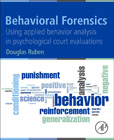
Behavioral Forensics: Using applied behavior analysis in psychological court evaluations presents the first compendia on the application of behavioral principles for assessment and analysis of criminal behavior in court-ordered psychological evaluations. Promotion of behavior analysis in criminology previously was abstract and aspirational, and recently re-appeared in books and articles on criminal and digital profiling and prison reform. But this coverage glossed over fundamental behavioral principles and limited discussion exclusively to police investigations. No other books and few articles exist showing advantages of Behavioral Forensic Assessment (BFA) to explain criminal motivation, risk behaviors, custody, criminal responsibility, and competence to stand trial. BFA employs principles and techniques of standard behavioral assessment in deducing causal evidence from interview and psychometric data. Analysis of self-reported data begins with operationalizing complex psychopathology into concrete and measurable units of stimulus-response and integrative-field contingencies. Next, corroborative data (police reports, witness statements, school records, etc.) offer social and predictive validity of the contingencies to prepare evaluations for expert testimony. Behavioral Forensics is divided into two sections. The first section introduces evidence-based concepts and principles of BFA compared to obsolete forensic evaluation models. The second section offers ten case studies illustrating BFA in pre-sentencing and post-sentencing evaluations that determine risk of criminal recidivism or competency for such common offenses as alcoholism, domestic violence, embezzlement, parental responsibility, criminal sexual conduct, and custody. Considering the unprecedented numbers of psychologists turning to forensic work, and influx of graduate programs offering degrees in criminal behavior analysis, Behavioral Forensics: Using applied behavior analysis in psychological court evaluations meets this imperative for a guidebook designed for beginners through advanced levels. Presents the advantages of using Behavioral Forensic Assessment (BFA) over relying on personality theoriesExplains criminal motivation, risk behaviors, custody, criminal responsibility, and competence to stand trial from a natural science (behavioral and interbehavioral) perspectiveIncludes case studies illustrating BFA in pre-sentencing and post-sentencing evaluationsOffers most scientific, evidence-based approach to criminal (forensic) psychological evaluations INDICE: Section 1: Concepts of Behavioral Forensic Assessment 1. What is Behavioral Forensic Assessment (BFA)? The role of Applied Behavior Analysis in Psychological Evaluation. 2. The paradigm shift from Traditional Models of Forensic Psychological Assessment to Behavioral Forensic Model. Section 2: Case Studies in Behavioral Forensic Assessment 3. Behavioral Predictors of Sexual Proclivity in a Sexual Offender. 4. Misentitlement of Thrill-Seeking Sexual Assault in Individuals with Unregulated Urges (Motivating Operations). 5. Intracontingency Variables in Criminal Responsibility Evaluations. 6. Risk of Alcohol Recidivism in Evaluating Reinstatement of a Driver's License. 7. Behavioral Forensic Analysis of Competency-to-Stand Trial in the Evaluation of an Offender Accused of Car-Jacking and Breaking and Entering. 8. Social Contingencies Potentiating Vandalism and Violence 9. Insularity Effects of Self-Reinforcement under Concurrent Variable Interval Punishment Schedules in the Assessment of Repeated Embezzlement 10. Cultural Contingencies of Survival Intermingled with Domestic Violence: A case of Evocative Effects of Metaphorical Extension 11. Contingencies of Vicarious Conditioning Resembling Munchausen by proxy in the Assessment of Parental Competence 12. Intrafamily Contingencies Exposing Contradictory Testimony and Parental Incompetence in Two Parents Vying for Child Custody 13. Avoidance/Escape (Operant) Conditioning and Respondent Biophysical Arousal in the Behavioral Forensic Assessment of an Adolescent Arsonist 14. Effective Communication of Psychological Evaluation Findings for the Court
- ISBN: 978-0-12-819805-6
- Editorial: Academic Press
- Encuadernacion: Rústica
- Páginas: 300
- Fecha Publicación: 01/11/2019
- Nº Volúmenes: 1
- Idioma: Inglés
